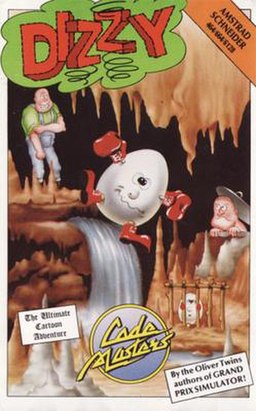Dizzy – The Ultimate Cartoon Adventure
| Dizzy - The Ultimate Cartoon Adventure | |
|---|---|
 |
|
| Publisher(s) | Codemasters |
| Designer(s) | Oliver Twins |
| Series | Dizzy |
| Platform(s) | Commodore 64, Amstrad CPC, ZX Spectrum |
| Release | June 1987 |
| Genre(s) | Arcade adventure |
| Mode(s) | Single player |
| Review scores | |
|---|---|
| Publication | Score |
| Crash | 78% |
| Sinclair User | 9/10 |
| Your Sinclair | 7/10 |
| ACE | 788 |
Dizzy, or Dizzy – The Ultimate Cartoon Adventure, was the first video game featuring the character Dizzy, an anthropomorphic egg. The game was designed by two British brothers, the Oliver Twins. Dizzy was published by Codemasters and was released in June, 1987.
Dizzy gets his name from the character's tumbles and somersaults while jumping, a feature inspired by the Oliver Twins' graphics software Panda Sprites which enabled them to rotate an image easily so each frame did not have to be manually drawn. The software distorted complex sprites so the character was required to be simple, hence the choice of an egg.
The game is a platform adventure where Dizzy must search the fairy tale land of Katmandu for a Leprechaun's Wig, a Cloud's Silver Lining, a Vampire Dux Feather, and a Troll Brew and deposit them in a cauldron to make a potion to defeat the evil wizard Zaks. The gameplay involves collecting items and moving to other locations where the item is required; for example, at one point a raincoat is needed to protect against damaging rain. This is made more difficult because only one item can be carried at any given time.
Unlike later games in the series, which focus more on the inventory-based puzzles, this game features a very large number of hazards that kill the player on contact. With only three lives initially to complete the game, this makes it a very difficult game to complete by today's standards.
The ZX Spectrum version was voted the 5th best game of all time for Sinclair computers in a special issue of Your Sinclair magazine in 2004. In 2017, the game placed on Eurogamer's "10 games that defined the ZX Spectrum" list.
The game includes several lines from J. Milton Hayes' poem The Green Eye of the Yellow God on banners in certain screens, where they serve as clues on how to solve some puzzles.
...
Wikipedia
